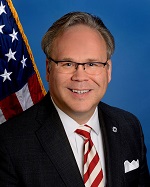 Walter E. Washington Convention Center, Washington, D.C. (Source: Dorti/Shutterstock)
Walter E. Washington Convention Center, Washington, D.C. (Source: Dorti/Shutterstock)
NCUA Board Member Todd Harper said Wednesday that the NCUA would have been "better served" if the agency had given New York City officials time to form a public-private partnership to purchase taxi medallion loans the agency holds.
Harper told those attending CUNA's Governmental Affairs Conference that now that the agency has decided to sell the loans to a private entity, he will be watching carefully to ensure that the purchaser follows consumer protection requirements.
Recommended For You
Agency officials last week, much to the consternation of beleaguered taxi drivers and medallion owners, said that they planned to sell the loans it holds to Marblegate Asset Management, a hedge fund.
Harper also told those attending GAC that he will continue to push for the agency to increase its overall consumer protection efforts.
 Todd Harper (Source: NCUA)
Todd Harper (Source: NCUA) "The NCUA board should create a dedicated program for supervising for compliance with consumer financial protection matters," Harper said during his speech at GAC. "In doing so, we will better safeguard member interests and ensure that the credit union system lives up to its commitment to serving members."
Harper attempted to fund such a program in the agency's 2020 budget, but that effort failed.
Harper also said he will continue to push for the agency to have power to supervise credit union third-party vendors.
"Closing this regulatory blind spot would better protect the credit union system from cyber-threats and place the agency on a more level playing field with the other financial institutions' regulators. It would also provide a measure of regulatory relief," he said.
The NCUA's other two board members also have endorsed that idea, but it would take congressional action to expand the agency's powers.
Harper also said the NCUA should ensure that everyone is counted when it determines whether a credit union meets its low-income designation. He said to that end, the agency should modify its rules to better account for service members who live on military bases in the U.S. and abroad.
Harper said he has studied credit union mergers and found that one of the two major reasons for such mergers is a lack of succession planning.
He said about one in five credit unions lack CEO succession planning.
He said he has seen data indicating that a large proportion of credit union executives are baby boomers who will be part of a retirement wave.
"With these retirements, flat budgets and tight labor markets, there is a real need for credit unions of all sizes to focus on succession planning, especially if we want to curtail credit union mergers," he added.
© Touchpoint Markets, All Rights Reserved. Request academic re-use from www.copyright.com. All other uses, submit a request to [email protected]. For more inforrmation visit Asset & Logo Licensing.






